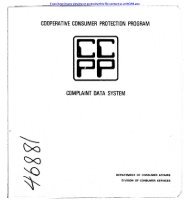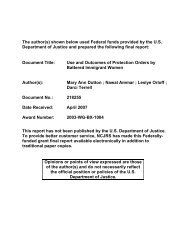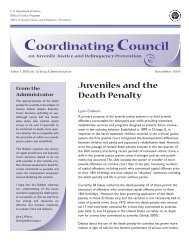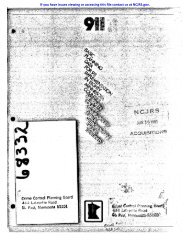Conflict Resolution Education - National Criminal Justice Reference ...
Conflict Resolution Education - National Criminal Justice Reference ...
Conflict Resolution Education - National Criminal Justice Reference ...
You also want an ePaper? Increase the reach of your titles
YUMPU automatically turns print PDFs into web optimized ePapers that Google loves.
Appendix D: <strong>Conflict</strong> <strong>Resolution</strong><br />
Glossary<br />
Active listening: A communication procedure<br />
wherein the listener uses nonverbal behavior, such<br />
as eye contact and gestures, as well as verbal behavior,<br />
including tone of voice, open-ended questions,<br />
restatements, and summaries, to demonstrate to the<br />
speaker that he or she is being heard.<br />
Agenda: A list of items for discussion; issues or<br />
problem statements assembled in a sequence that<br />
facilitates efficient discussion and problem solving.<br />
Aggression: Forceful action or attack.<br />
Arbitration: Intervention into a dispute by an independent<br />
third party who is given authority to<br />
collect information, listen to both sides, and make<br />
a decision as to how the conflict should be settled.<br />
Avoidance: The practice of nonengagement.<br />
Basic needs: Needs that underlie all human behavior,<br />
such as survival, self-esteem, belonging,<br />
self-actualization, power, freedom, and fun. Like<br />
individuals, groups have basic needs, including the<br />
need for identity, security, vitality, and community.<br />
BATNA: An acronym for Best Alternative To Negotiated<br />
Agreement, the standard against which any<br />
proposed agreement is measured.<br />
Bias: A preconceived opinion or attitude about<br />
something or someone. A bias may be favorable<br />
or unfavorable.<br />
Brainstorming: A storm of ideas. A group thinking<br />
technique for helping disputants create multiple<br />
options for consideration in solving a problem.<br />
Brainstorming separates the creative act from the<br />
critical one—all criticism and evaluation of ideas<br />
are postponed until later.<br />
D–1<br />
Caucus: A private meeting held with mediator(s)<br />
and disputant(s) to discuss needs and interests, the<br />
negotiating plan, and ways to make the procedure<br />
more productive.<br />
Clarify: To make clearer or to enhance understanding.<br />
During a conflict resolution procedure, openended<br />
questions are often used for clarification.<br />
Collaboration: Working with the other to seek solutions<br />
that completely satisfy both parties. This involves<br />
accepting both parties’ concerns as valid and<br />
digging into an issue in an attempt to find innovative<br />
possibilities. It also means being open and exploratory.<br />
Common interests/common ground: Needs and/or<br />
interests that are held jointly by the parties in a<br />
negotiation.<br />
Community: A social group having common interests,<br />
identity, and customs.<br />
Competition: A strategy in which one pursues the<br />
satisfaction of his/her own interests at the expense<br />
of others—a win-lose approach.<br />
Compromise: Seeking an expedient settlement that<br />
only partially satisfies both people. Compromising<br />
does not dig into the underlying problem, but rather<br />
seeks a more superficial arrangement, e.g., “splitting<br />
the difference.” It is based on partial concessions—<br />
giving up something to get something—and may<br />
have an underlying competitive attitude.<br />
<strong>Conflict</strong>: An expressed struggle between at least<br />
two interdependent parties who perceive themselves<br />
as having incompatible goals, view resources as being<br />
scarce, and regard each other as interfering with<br />
the achievement of their own goals; a controversy or<br />
disagreement; coming into opposition with another<br />
individual or group.

















